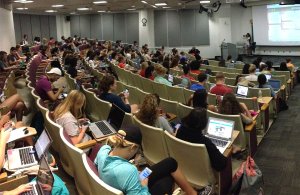by Julie Dodd

Falcon Restrepo-Ramos receives the Calvin A. VanderWerf Award from Dean of the Graduate School Henry Frierson and Dr. Constance Shehan, chair of the selection committee. The VanderWerf Award is given to the top of the teaching award winners. Morgan Yacoe also received the VanderWerf Award. Photo by Julie Dodd
Promoting student involvement.
Connecting learning to important issues.
Assigning meaningful projects.
Establishing a supportive learning climate.
These were some of the effective teaching strategies employed by the graduate students who were selected to receive the University of Florida’s Graduate Student Teacher Awards for 2019.
As a member of the faculty committee that observes the graduate students nominated for this award, I could feel the energy of those really engaging instructors when I visited their classes. I admired the graduate students’ course design and class planning to create such good learning experiences for their students.
Structuring class activities to get students involved
In the classes I observed that were taught by award-winning graduate students, their students were actively involved. Here are three examples I observed.

The winners of the University of Florida’s Graduate Student Teaching Awards for 2019 and members of the selection committee. Photo by Eric Zamora
In a physiology lab, the students worked in teams to review the results of the physiology lab they had conducted independently online.
Talking with classmates in a small group helped them answer some of their own questions about the lab and prepared them to share their experiences and the questions they still had with the class. In addition, after talking in small groups, the students were more confident in speaking in class.

